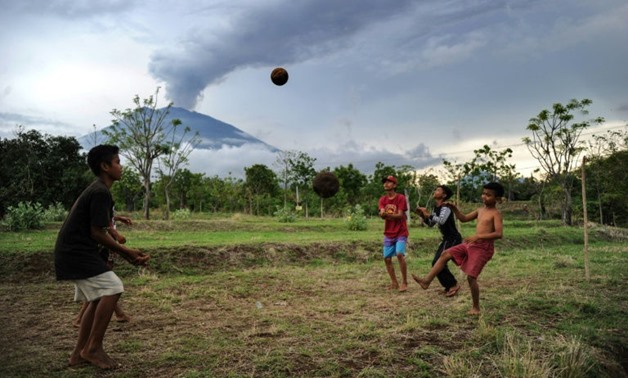
Indonesia's tourism minister says Bali could lose up to $665 million in visitor-related revenue if Agung doesn't die down before the end of the year
JAKARTA- 1 December 2017: Australian Tiarna Thompson had her dream Bali wedding all set, but there was one thing she did not count on: a volcano threatening its first major eruption in half a century.
The 24-year-old and her fiance Justin saw their plans go up in smoke when Mount Agung rumbled to life, spewing ash and fumes that forced hundreds of flights to and from the island to be cancelled.
"It's funny how a volcano can just turn our plans and our whole lives sort of upside down, just like that," said Thompson from her home near Brisbane.
The couple, who had planned to get hitched in the picturesque tropical paradise this week have hurriedly switched their nuptials to Thailand.
"It had the last 50 years to do its thing and it waits until our wedding day," she joked, referring to Agung's last major eruption in 1963, which killed about 1,600 people.
The volcano's rumblings in the past week have pounded Bali's lucrative tourism industry and its wider economy, squeezing everyone from wedding planners and dive shops to hotels and even some farmers duped into selling livestock at cut-rate prices.
Indonesia's tourism minister Arief Yahya warned this week that Bali could lose up to nine trillion rupiah ($665 million) in visitor-related revenue if Agung's activity doesn't die down before the end of the year.
Millions visit the Hindu-dominated tropical hotspot annually, with couples there to tie the knot at beach and cliffside retreats that offer sweeping views of the ocean.
Others want to get even closer to waters teeming with colourful fish and coral.
"There has definitely been a huge effect because of the volcano," said Ni Komang Astiti, who works at dive operator Dune Atlantis in the southeast of the island.
"We've had many cancelations because the guests can't fly to Bali."
- 'What should we do?' -
Bali's main international airport was shut for almost three days from Monday as towering columns of volcanic ash and smoke made flying dangerous, sparking travel chaos and leaving around 120,000 tourists stranded.
It re-opened late Wednesday, but mostly for tourists departing the island, not arriving.
"If we usually have 20 guests a day, this time around it's only two people," Astiti said.
"We're worried. If there are no guests, what should we do? We depend on the tourism industry."
Thompson's wedding planner Ni Made Rismawati said Agung has also taken a bite out of her business, with another couple also cancelling their wedding.
"I feel bad for the clients," Rismawati said.
"They have to cancel their wedding even though they have prepared everything."
Volcano experts warn that the mountain, which has had a series of mini eruptions, could still produce a major blast, even as much of the smoke and ash appeared to dissipate.
Another volcano, Mount Sinabung on Sumatra island, has been active and at the highest alert level since 2013.
There's nothing we can do -- we can only wait for the mountain to stop erupting," said I Ketut Ardana, the head of a Bali tourism association, who estimated that just three days of airport closures had cost the island some one trillion rupiah.
"It's a natural disaster so we can't ask it to stop."
But it's not just the tourism sector suffering.
Tens of thousands of Balinese villagers living in small communities that ring Agung have fled to evacuation centres.
Many complain about lost work and some are sneaking back into the danger zone to take care of precious livestock that, for many, are their only source of income.
Local media said some unscrupulous buyers have supplied mis-information about Agung's activity so unsuspecting farmers will sell off livestock at cut-rate prices.
Officials have been trying to convince villagers not to return to their homes, as they also push back foreign thrill-seekers keen for a close-up look at the volcano.
But Indonesia's disaster agency said desperate times are forcing a re-think, suggesting the possibility of turning Agung into a disaster tour venue.
It cited Iceland's Mount Eyjafjallajokull as an example, though it acknowledged there were pros and cons.
"Disaster tours need to be managed well," said agency spokesman Sutopo Purwo Nugroho.
"Tourists would need to be fully informed before they arrive, and signs showing the danger zones would need to be properly in place."


Comments
Leave a Comment